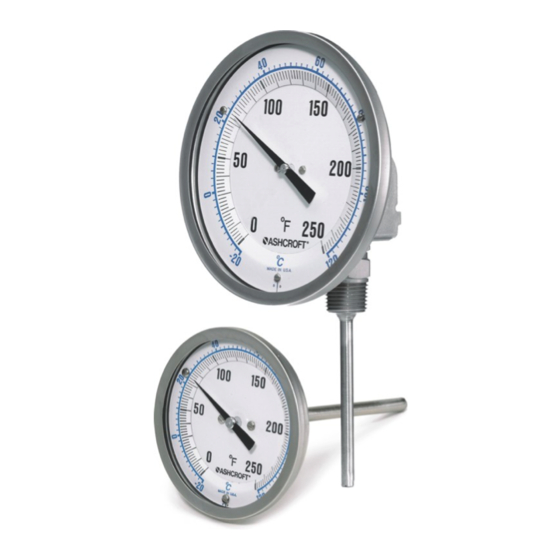Ashcroft A3B Manuel d'instructions pour l'installation et l'entretien - Page 11
Parcourez en ligne ou téléchargez le pdf Manuel d'instructions pour l'installation et l'entretien pour {nom_de_la_catégorie} Ashcroft A3B. Ashcroft A3B 19 pages. Bimetal thermometer

8 Assembly/Installation
8.1 Preparation
To ensure safe working during installation and maintenance, suitable thermowell must be installed in the system, by
means of which the unit can be
can be removed for repair or inspection within the plant
subjected to a functional check on site.
The suitability of the device and the thermowell (if required) for the medium to be measured, the selection of the
measuring range and the protection against special conditions such as vibrations must be checked.
During assembly/installation work, the system must be secured against being switched on again.
It is recommended to perform the assembly / installation without an existing explosive atmosphere (e.g. ventilated
room).
8.2 Requirements for the installation site
Check the suitability of the device for the process media to be measured,
Design of the measuring range to the requirements of the measurement,
Ex works, the device is supplied and calibrated for vertical installation.
If the installation location deviates from the vertical (max. ± 5°), the zero setting on the indicator must be corrected
(see 8.4.1 Zero adjustment).
Protection against mechanical vibration, e.g. by means of a flexible capillary line.
The following limits must not be exceeded under any circumstances:
Frequency of mechanical vibration: max. 150 Hz
Acceleration: max. 0.5 g (approx. 5 m/s
8.2.1 Every angle connection (optional)
Only adjust the every angle connection if this is necessary during fitting or
removal.
Use the every angle connection to place the sensor in the correct position
prior to installation, proceeding as follows:
Position the thermometer housing in a straight alignment (Position "C")
Using the screws marked "A", loosen until the joint can be turned freely
through 180° on the lower part of the housing and the sensor.
Hold the thermometer housing firmly with one hand, and with the other hand
turn the joint piece until the inner part of the joint is showing in the desired
direction of bend.
Firmly tighten the aforementioned Screws "A" again.
Loose the screws marked "B" and move the joint into the desired direction of
bend.
Firmly tighten the aforementioned Screws "B" again.
8.3 Process connection
The process connections comply with the general technical regulations for thermometers. Thread types and materials
of the process connections may vary depending on the application..
Assembly of the device only by authorized and qualified personnel.
The device must be integrated into the equipotential bonding of the process installation (e.g. by using an
electrically conductive seal).
Use only with the mechanical process connection provided – regarding the configuration, see order code on the
device type label.
)
2
page 11 of 19
